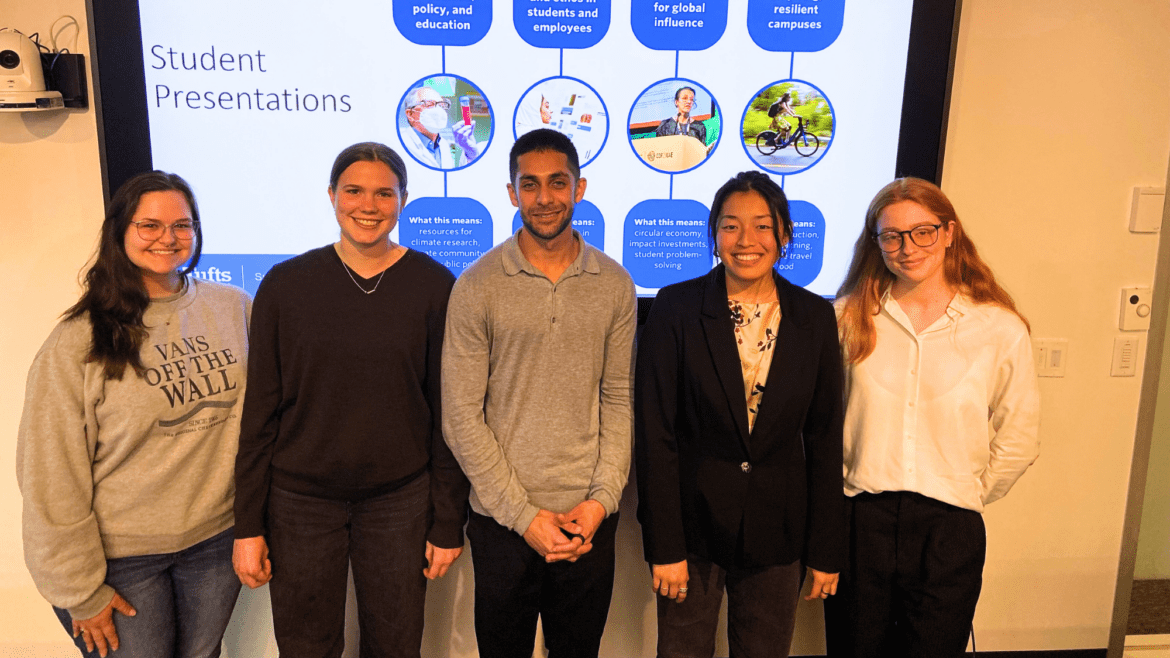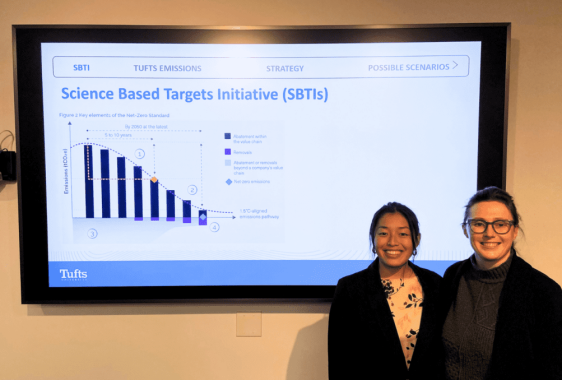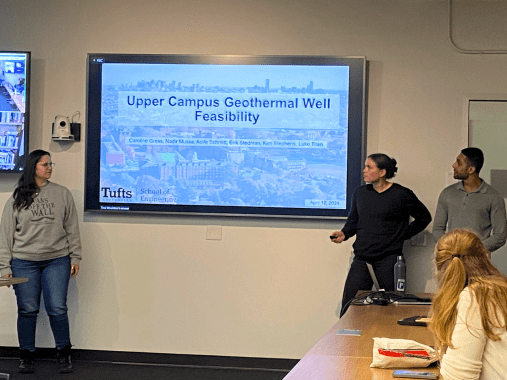Charting the Path to Net-Zero: Students Present Decarbonization Recommendations to Tufts Sustainability Council
Thursday, April, 18th, 2024 Curricular Engagement News Student Programming

(L to R) Caroline Gress, Aoife Schmitt, Nadir Mussa, ShaSha Kingston, and Bergen Kane are among the seven students who presented their sustainability projects to Tufts Sustainability Council.
Over 150 students at Tufts have conducted research projects this academic year to help Tufts make progress on its sustainability goals. With a focus on helping direct Tufts’ decarbonization strategy, these undergraduate and graduate students represent a myriad of areas of study from the School of Arts & Sciences, School of Engineering, The Fletcher School, and the Department of Urban and Environmental Policy and Planning.
Four of these student projects were presented to Tufts Sustainability Council at their meeting on Friday, April 12th to demonstrate the ways that students are helping Tufts solve problems of sustainable development that exist on our campuses.
Building a Carbon Roadmap

ShaSha Kingston (left) with Dr. Ann Ward (right), Education & Outreach Specialist for the Office of Sustainability
What is it? A visual model aligning Tufts’ decarbonization strategy with a global carbon reduction framework.
Why? To ground Tufts’ strategy within science-based targets that provide emissions benchmarks along the road to net-zero emissions by 2050.
Who’s involved? ShaSha Kingston (A24), a Sustainable Solutions Fellow and Biology, Psychology, and Environmental Studies major, who synthesized carbon modeling research to find a framework that fits the complex process of decarbonizing Tufts’ campuses.
What makes it unique? While Tufts has been working on decarbonization for decades, this framework aligns Tufts’ strategy with the Paris Climate Agreement and sets an interim goal of reducing emissions by 50% by 2030.
Defining our Scope 3 Carbon Emissions
What is it? An analysis of the climate commitments of Tufts’ top 120 vendors.
Why? To begin quantifying the climate impact of the companies Tufts works with in order for the university to achieve meaningful decarbonization.
Who’s involved? Bergen Kane (A26), a Sustainable Solutions Fellow and engineering major, developed a method of analyzing the university’s purchasing data and evaluating the climate impact of Tufts’ supply chain. She has found that about half of Tufts’ vendors currently have some kind of climate commitment.
What makes it unique? Calculating scope 3 carbon emissions is a developing concept within sustainability. Bergen is experiencing the same difficulties with quantifying scope 3 emissions that sustainability professionals are grappling with today.
Designing Campus Geothermal

(L to R) Caroline Gress, Aoife Schmitt, and Nadir Mussa present their feasibility study of installing geothermal to the upper part of the Medford/Somerville campus.
What is it? Testing the feasibility of ground-source heating (a similar concept to geothermal, but with different components) on the upper campus of Tufts Medford/Somerville campus.
Why? To teach students about engineering project management and develop a strategy for electrifying our buildings to be compatible with renewable energy.
Who’s involved? 16 students in the Civil and Environmental Engineering Capstone Class, three of which, Aoife Schmitt (E24), Caroline Gress (E24), and Nadir Mussa (E24) are focusing on how ground-source heating can be installed underneath the upper campus quads.
What makes it unique? Students toured Tufts’ current energy infrastructure on campus, including the Central Energy Plant, to see firsthand the complexity of transitioning an actively functioning campus with existing infrastructure to plug into low-carbon energy sources.
Conducting a Campus Tree Inventory
What is it? A collection of physical campus tree data, community perceptions of campus trees, and the estimated ecosystem services provided by these trees.
Why? To teach students field research skills and help the university understand how its trees can help create climate-resilient campuses.
Who’s involved? The project leads are Ben Chiasm (A24), Environmental Studies major and Tufts Green Fund recipient, Trevor Davis (A24), Environmental Studies major and Sustainable Solutions Fellow, and Ben Davies, Lecturer in the Environmental Studies Department.
What makes it unique? The project evolved to become a collaborative effort that began with a Tufts Green Fund proposal from Ben Chism and then was taken up by ENV120, Introduction to Environmental Fieldwork, taught by Ben Davies, and finally by Trevor, a Sustainable Solutions Fellowship. In total this project has engaged almost 20 total Tufts students, faculty, and staff.